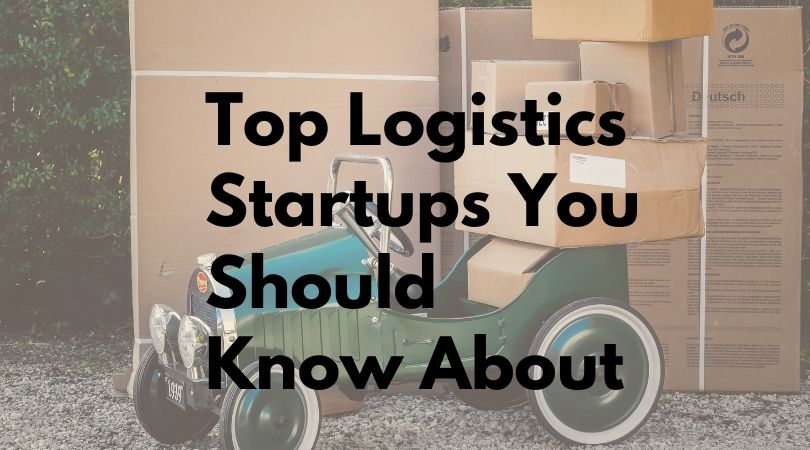Top 6 Game Changing Logistics Startups You Should Know About
- 11 March 2020 | 1600 Views | By Mint2Save

Logistics is not an easy business for startups because it is regulated. Now, with the advent of supply chain management, the already established business in the logistics industry is not investing in technology or modernization of the process. Hence, there is a lot of scope for startups to innovate in the industry and create a space for themselves.
Traditionally, logistics have played a big role in the growth of large economies around the world. It all started with shipping when navigators found new trade routes across the world which helped companies establish their bases in Asia. The biggest revolution in logistics was aided by the invention of the airplane.
We have come a long way when it comes to technology in the past decade – from carrying smartphones for the first time to seeing it become a necessary part of our life. Every single industry has gained from the technological innovations which means logistics should not miss their chance. Lots of logistics companies are coming up each day and are challenging the established ones in a very short time. Even the investors are constantly increasing their presence in this industry.
So let us see some of the world’s best logistics startups which may become the next big thing –
Convoy
Convoy is one of the best logistics startups available and is considered Uber for the freight shipment. It is a US-based digital logistics company founded in 2015 and its mission is to make the road freight shipments more efficient. Currently, it is amongst the biggest operators in the US and the company provides a platform that matches truckers with shippers needing to move cargo.
Both carriers and shippers can sign up with the Convoy service. When a shipper is ready to make a shipment, the app contacts a carrier by sharing the details of the best fit route available based on several factors: which driver has an existing route that best overlays the pickup and drop off points, which driver is closest to the pickup point, and which driver has the right amount of space in her/his trailer.
Recently they received a funding of $400 million in a Series D funding which values the business at $2.75 billion. The company is looking at the markets outside the US and plans to invest more in the outside market in the future.
OneRail
It is an Orlando based orchestration and fulfillment platforms that consolidate the needs of shippers and retailers on a single platform. The company streamlines operations by providing them a scalable, dependable and affordable final mile solution.
The time has changed and now the deliveries are spread across large geographies. Deliveries have become more complex and hence a need to have a single platform to manage all of these in deliveries is a must. OneRail idea is to replace the complexity with one single platform that can track and monitor everything that falls under the last-mile.
How are they different from their competitors? They bring in a human element to their orchestration platforms along with the technology. OneRail provides logistics management for all deliveries. For shippers, they not only use the technology to match the freight with the right delivery network but also manage it via people.
They also provide exceptions managements for the deliveries that do not go as planned, for example- these could be deliveries that arrive late, have an issue with entered address or have damaged goods. Since the company is integrated with the carrier’s application, it can instantly recognize exceptions and work with the customer to make sure the issue is addressed.
The startup also offers a comprehensive Omni channel fulfillment solution by integrating with the point-of-sale, the actual cash register at the store, the e-commerce platform, as well as the ERP system.
It has recently raised $5.8 million in seed funding.
Leap India
Leap India, which started in 2013 is a leading pallet and a container rental provider. Among various logistics startups “Leap India” provide a range of services such as strategic management, lumber sourcing, sales & supply chain, distribution & channel marketing.
They offer services to companies in sectors such as fast-moving consumer goods (FMCG) companies, consumer durables, auto companies, and beverages, also provides transport facility to the customers during either primary or secondary movement of products.
Their network comprises 22 warehouses, 25 contract manufacturing centres and a team of 450 employees serving over 550 customers at over 7,000 touch points in India. Internationally, goods are stored and moved with the help of forklifts which drives the demand of storing and transporting goods in pallets.
They are planning to deploy more pallets to its customers on lease. Three million pallets were leased last year, the demand for pallets-on-lease is estimated to go up to four million pieces this year. LEAP India is planning to deploy a bulk of it since it holds 70% market share in pallets and in foldable large containers.
Rivigo
Rivigo provides hassle free, reliable, professional and super-express logistics services to its client. They have a simple process, advanced technology, trained and professional staff to help clients manage long haul logistics seamlessly. Rivigo coordinates delivery trucks going between different cities, using technology and innovative operational processes and aims to significantly improve the truck driver ecosystem and operational efficiencies in the process.
Their mobile app for the drivers makes life simpler by proving a one-stop solution for all their needs. The app, more image-based than text, is available in 11 languages. As per its founder, it is the only company in the world to have cracked the relay trucking model.
The company owns 3,000 trucks that cover 29,000 pin codes across the country. It has created a huge network of over 70 pit stops and 200 branches.
The company has raised $65 million from existing investors Warburg Pincus and SAIF Partners in its recent round of funding and to date has raised a total of $180 million. With the recent round of funding, it has entered the elite unicorn club.
Nuro
It is an self-driving startup founded by two ex-Google engineers. Today, Nuro is one of those rare companies which are operating fully driverless vehicles on the public roads. They provide a vehicle called R1 which is half the size of a compact sedan and has no room for human passengers or drivers. They have built six of these cars so far.
These cars are designed to deliver – get anything, anywhere and at any time. They have a flexible interior design and can handle errands of various kind including dinner to dry cleaning.
It is efficient, fully electric and autonomous and can deliver your needs at a price which is very affordable.
Perhaps the most remarkable feature about the company is Nuro’s team which is made up of the very best minds from academia and industry. Their team consists of veterans in robotics, autonomous vehicles, consumer electronics, and automotives — from Google, Waymo, Apple, Uber, Tesla, and GM. They come from some of the world’s top universities — including Berkeley, Cambridge, Caltech, Chicago, CMU, Freiburg, Fudan, Harvard, MIT, and Oxford.
With funding of over a billion dollars, they are currently valued at $2.7 billion.
Flexe
Flexe is considered Airbnb for warehousing. Flexe is a Seattle based logistics startup that operates an on-demand warehouse marketplace. Instead of matching travellers with apartments and open homes, it matches retailers with warehouses that have excess capacity. Flexe benefits warehouse owners who make revenue on the warehouse space they own. This place would have otherwise been empty, and Flexe estimates it 20-30 percent of a given warehouse. Up from 370 warehouses three years ago Flexe now has more than 1,000 of them across the U.S. and Canada. Owners use Flexe’s software to bid on various available offers.
Flexe over the years has invented the on-demand warehousing category for businesses that face a crisis of agility while trying to meet rising consumer demands.
The advantage Flexe holds when compared to its competitors is that it offers customers to pay ‘as you go’ flexibility. As a merchant you don’t need to sign long-term leases for warehouse space — only when you know how much capacity is required, as well as where and when.
Started in 2013, Flexe has amassed a huge warehouse footprint, with approximately 30 million square feet available on its platform. That’s still a far cry from Amazon, which owns 150 million square feet of space. However, Amazon is limited to 110 fulfillment centers in North America, while Flexe has access to more than 1,000 warehouses.
These are just six of many logistics startups which are creating a name for themselves in the industry, do let us know the ones you think that can be added to this logistics startups list and can be the next big thing.










